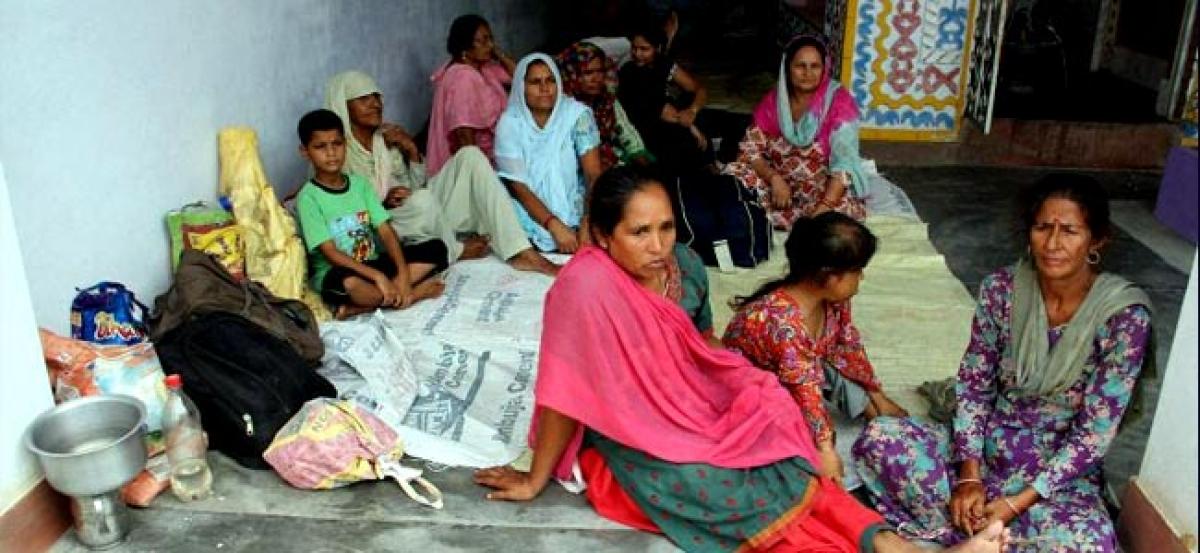Live
- The Unstoppable Artistic Odyssey of Yasmin Sawhney
- Raghavendra Swami’s 430th birth anniversary celebrated
- Ensure smooth arrangements: Collector
- Cong will give return gift: Sridhar Babu to Bandi
- Nellore: Police conduct ‘Open House’
- National Lok Adalat tomorrow
- CM Seeks 100% Central aid to two Metro rail projects
- India will be globally No. 1 by 2047: Naidu
- 300+ quintals Talambras to meet devotees’ demand
- ‘Save Telangana – Support BJP’ will be our mantra: Kishan Reddy
Just In

Over 100 sites have been identified by authorities in Jammu region to set up camps to meet exigencies along the Indo-Pak International Border but the majority of border dwellers are preferring to stay back at their homes to tend to their crops and cattle.
Jammu: Over 100 sites have been identified by authorities in Jammu region to set up camps to meet exigencies along the Indo-Pak International Border but the majority of border dwellers are preferring to stay back at their homes to tend to their crops and cattle.
The number of people staying in the safe camps in the three districts of Jammu region has been dwindling as the border residents are not ready to leave their houses behind, officials say.
Deputy Commissioner of the frontier district of Kathua, Ramesh Arora told PTI that "There are two to three villages in the district from where over 250 people have completely migrated and are staying in three safe camps which are functional. The rest of the people are unwilling to leave their houses and fields".
"We have identified over 34 places in the entire district which can accommodate over 15000 people. In case of any exigency, these are the people who will be directly affected, but so far 20 camps have been made functional out of which people are staying in only three camps", Arora said.
He said while majority of the people have returned to their houses, there are some who have shifted to their relatives' place in Jammu and other places. "We are ready to deal with any contingency", the DC said.
Similar is the situation in the frontier district of Samba where over 25,000 border residents would get affected in case of any exigency.
"Several sites have been identified for setting up of safe camps, out of them five have been made functional, but as the border in this district has remained peaceful so far there is no migration so far. We are fully geared up to meet any exigency", DC Samba, Sheetal Nanda said.
In the frontier areas of Jammu district, the number of people staying in the safe camps has also dwindled as the people want to tend to their standing crops. "The number (of border migrants) is negligible on the RS Pura and Arnia side, but it is there on Akhnoor and Khour side," DC Jammu, Simrandeep Singh said.
In RS Pura sector alone, authorities have set up eight safe locations which can house over 15000 residents of over 33 villages of the border belt.
The mainstay profession of the border residents is either rearing of cattle or farming as they don’t want to abandon the two and shift to the safe camps. "The members of Gujjar community have been rearing cattle and living along the border since generations. In order to save their lives they have to abandon their cattle," secretary of the Tribal Research Foundation, Dr Javid Rahi said.
In the past too during the ceasefire violations people from the community have lost a large number of their livestock, so they are compelled to stay back and tend to their cattle unless the government provides them with facility to shift their cattle to safer locations.
Baljinder Singh, in-charge of the safe camp at Bana Singh Stadium in RS Pura that has been set up for five villages to host 1000 border migrants, say that people who come to stay in the camp are worried about their livestock.
"So far 72 people have registered at this camp, majority of them come here during the night and leave early in their morning as they have to tend to their cattle, milch them and provide fodder to them", Singh said.
He said majority of the male members who come to stay in the camp during the night leave at daybreak to take care of their cattle. "This could be one of the reasons that majority of the border residents are reluctant to shift to these safe camps as they have to tend to their crop and cattle", Singh said.

© 2025 Hyderabad Media House Limited/The Hans India. All rights reserved. Powered by hocalwire.com







